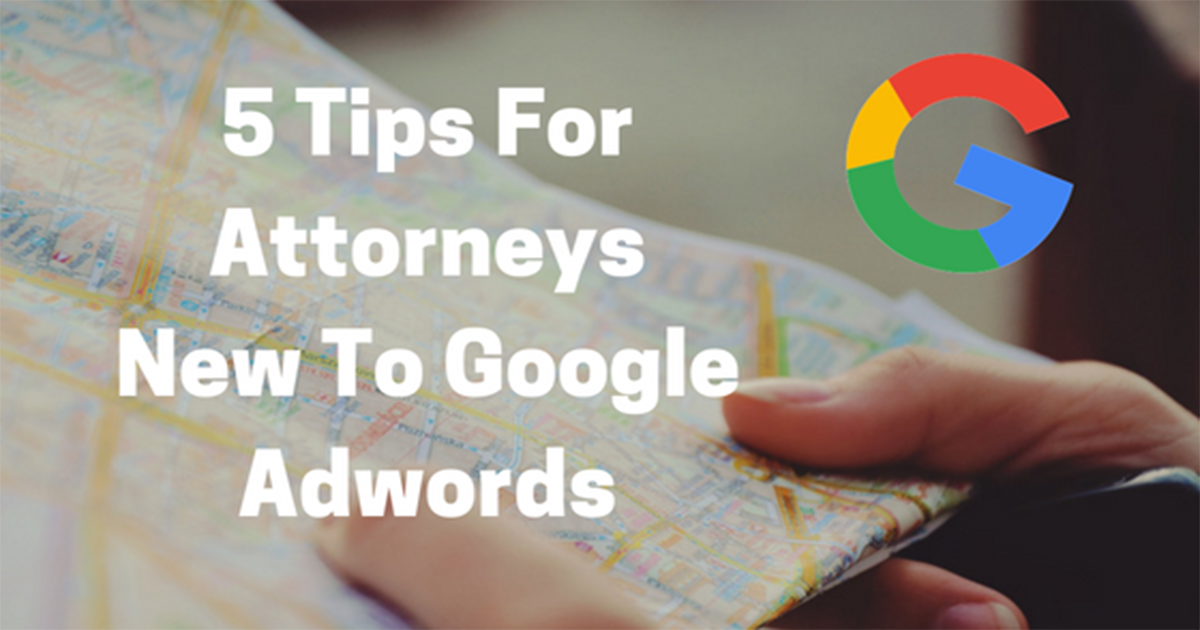
Google Adwords can be a great place to begin if you’re interested in driving more traffic and business to your law firm online. However, if you’re new to Google Adwords, you may be unsure of where to begin. Here are five tips that every law firm should know before you dive in.
Many people assume that the more popular the keyword, the more effective it will be for your campaign. However, just because a keyword gets a high volume of searches every month doesn’t mean it’s going to bring in clients for your firm. Broad keywords will get your ads in front of more people, but the more specific your keywords are to your business, the more qualified your clicks and leads will be.
If you use a broad keyword, Google can be very lenient in showing your ad for related searches. This can cause your ad to display for searches that are irrelevant for your business. For example, if you’re an attorney bidding on the broad keyword “lawyers,” your ad might be eligible to show for a search like “bankruptcy lawyers” or “divorce lawyers.” Depending on your areas of practice, you might not even provide the type of legal help that the searcher is looking for.
To prevent spending money on clicks that won’t drive business, bid on more specific terms such as “personal injury lawyer” (if this is what you do) and add terms such as “divorce” as a negative keyword (if you don’t take family law cases). This will ensure your ad is not eligible to show whenever a word irrelevant to your business is present in the search.
Even if you have a list of several great keywords that you want to use, it’s a mistake to try to use too many of them in one ad group. When you stuff an ad group with a variety of keywords about different topics, you won’t get optimal results for any of them. It is a best practice to keep keywords in each ad group tightly related to one topic. For example, if you are a family law attorney, you might have one ad group for custody terms and a separate ad group for divorce.
If your keywords start to branch across multiple themes or topics, create an ad group or campaign for each. This way you can keep your ad copy highly relevant to your keywords and improve your click-through rate. A high click-through rate means not only more visits to your website but also an improvement to your quality score. A higher quality score can help generate the same clicks but at a lower price, improving your return on investment.
To make sure your Google AdWords campaigns are generating a positive ROI, it’s important to implement conversion tracking. With conversion tracking, you can determine which keywords or ads are driving the most business to your firm. Otherwise, you could end up spending a lot of money on ads that aren’t getting you closer to your business goals. One ad may get more clicks, but if none of those clicks are converting into leads via calls, forms, or chat, you could be spending money on the wrong keywords. It’s a good idea to monitor your campaigns at least once per week to make sure they’re performing in line with your goals. If an ad or keyword is under-performing, pause or replace it. If a keyword is exceeding your conversion goals, you could consider raising your bid to ensure it is shown more often.
Every Google ad must include a link to a page on your website. Instead of directing people to your homepage, send them to a targeted landing page. The landing page you choose should be as relevant to your ad copy and keywords as possible. If you mentioned a particular service in your ad, be sure to link to the landing page about that service. If you mentioned a deal or promotion in your ad, make sure that is addressed on your landing page as well.
Even though your homepage explains the general information about your firm, landing pages are more effective when it comes to converting visitors into leads. You want someone to find exactly what they were searching for when they clicked through from your ad. By matching your landing pages with your keywords and ad copy, the user will find the information they expect without having to search for it, meaning a better overall user experience.
If you don’t know what you want from your Adwords campaigns, it can be difficult to determine if they are working for you. Before you run your first ad, it’s a good idea to think about your business goals. How many clients do you want to get each month with your budget? After you’ve determined that number, figure out how many potential clients it takes on average for you to sign up one new client. The number of potential clients you need each month is going to be the number of conversions you want to get from your Adwords campaigns. Deciding these early on will help you determine the best settings for your campaign and which metrics to track.
It can be overwhelming trying to set up an Adwords account for your law firm for the first time or to jump back into the game. However, you don’t have to have a perfect account structure from day one. Google Adwords makes it easy to experiment with which techniques work for you and to set a budget that fits your individual business needs.
If you want to outsource all of this, Client Chat Live can connect you with some of our partners who focus on helping law firms get more potential clients from their websites. Contact us today at 808-495-0231 and we can put you in touch with trusted and reputable companies so you can start improving your online presence. Good luck!





